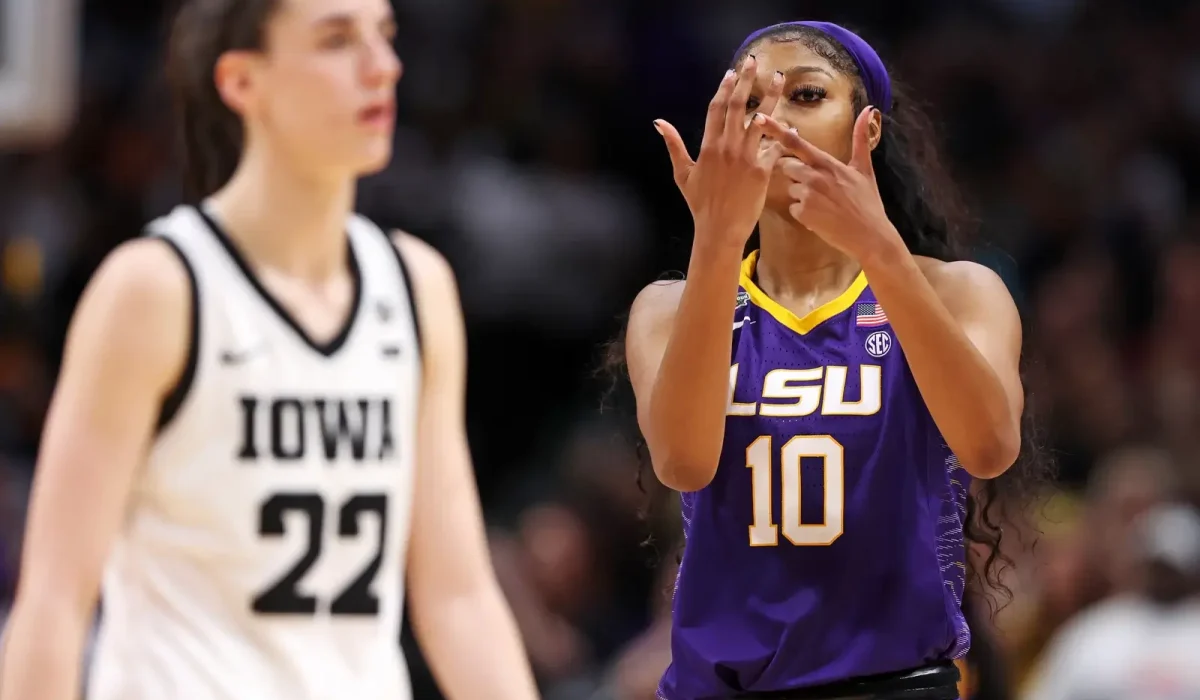In the women’s NCAA tournament final, Louisiana State University emerged victorious over the University of Iowa in a historic and thrilling matchup. During the game, a notable incident occurred involving two prominent players, an iconic catchphrase from wrestler John Cena, and a frenzy on social media.
Here’s what transpired: Angel Reese, a forward for LSU, celebrated her team’s lead in the fourth quarter, indicating their impending victory, by making a hand gesture popularized by the wrestler as “You Can’t See Me.” She waved her hand in front of her face and tapped her ring finger while directing her gaze at Caitlin Clark, the guard for the Iowa Hawkeyes.
This moment quickly gained widespread attention as it went viral, with commentators and observers criticizing Reese for what they perceived as unsportsmanlike behavior towards Clark. The term “classless” even became a trending topic on Twitter.
It is important to note that Reese is Black, while Clark is white.
Both players have been exceptional throughout the March Madness tournament this year. Reese, aged 20, was honored as the Most Outstanding Player on Sunday, while the 21-year-old Clark, who had already been named Player of the Year by various associations for 2023, achieved multiple records during the tournament. Clark scored a remarkable 191 points, the highest ever by any individual, male or female, in a single NCAA tournament.
Furthermore, it is worth mentioning that both players employed the same hand gesture during this year’s March Madness. Clark made the gesture earlier in two games when Iowa defeated Louisville to secure a spot in the Final Four.
But she didn’t get criticism for it. In fact, she earned praise, including from Cena himself.
Even if they could see you…they couldn’t guard you!
— John Cena (@JohnCena) March 28, 2023
Congrats on the historic performance @CaitlinClark22 and to @IowaWBB on advancing to the Final Four! @MarchMadnessWBB #WFinalFour https://t.co/QvpYDTESwb
Following the criticism faced by Reese for her gesture, numerous individuals, including professional athletes, took to Twitter to highlight the existence of a racist double standard.
According to Kevin Blackistone, a sports columnist for The Washington Post and panelist on ESPN, this occurrence is not an isolated incident. During an interview on Monday with Morning Edition, he cited historical examples to support his argument. For instance, Jack Johnson, the first Black heavyweight boxing champion in the early 20th century, was unjustly labeled as cowardly for utilizing a defensive boxing style that white fighters were praised for employing their cunning in. Blackistone also mentioned Joe Lilliard, an NFL halfback in the early 1930s, who faced criticism despite exhibiting a similar level of assertiveness as his white counterparts.
Blackistone further expounded on the issue, emphasizing that we have been conditioned to perceive and evaluate similar behaviors differently when exhibited by white athletes versus Black athletes. He regarded this incident as yet another example of the qualitative evidence supporting this observation.
How it started How it’s Going pic.twitter.com/YRNzDN1iUr
— Robert Griffin III (@RGIII) April 2, 2023
Many athletes, commentators and fans are calling out the people who have criticized Reese, questioning why they didn’t take issue with the gesture when Clark did it.
“If you didn’t say it was classless when Caitlin Clark did it to her opponents then don’t say it about Angel Reese either,” tweeted former Baylor quarterback and Heisman winner Robert Lee Griffin III.
Retired NBA player Etan Thomas called people out for finding it “cute” when Clark did it, “So don’t be all outraged and talking about class and sportsmanship when Angel Reese does the same thing.”





